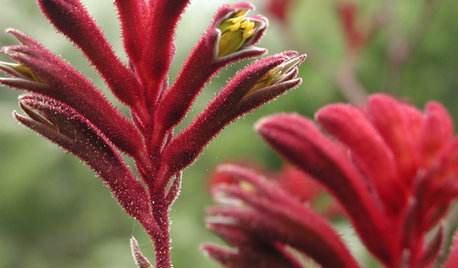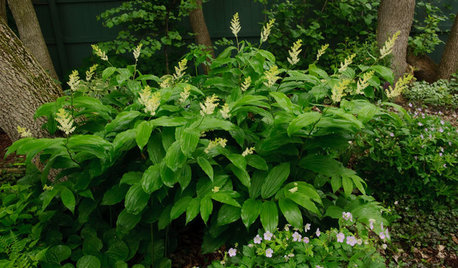Paw Paw
herbalpower
20 years ago
Related Stories

GARDENING GUIDESGreat Design Plant: Red Kangaroo Paw
Plant this dramatic perennial in fall or spring for its height, hardiness and beautiful red blooms
Full Story
PETSRoom of the Day: Laundry Room Goes to the Dogs
Muddy paws are no problem in this new multipurpose room
Full Story
GARDENING GUIDESGarden-Friendly Native Alternatives to Overplanted Exotics
There are lots of gorgeous, wildlife-friendly native plants ready to make an appearance in your garden
Full Story
EDIBLE GARDENSHow to Grow 10 Favorite Fruit Trees at Home
Plant a mini orchard in fall, winter or early spring to enjoy fresh-off-the-tree fruit the following year
Full Story
FURNITUREPut Your Furniture's Best Foot Forward
Hoof it up the high-design way with animal-shape feet that add eye-catching decorative flair to stools, benches, tables and chairs
Full Story
HOUZZ TOURSMy Houzz: California Hilltop Home Inspires Artistry
A desk made of airplane parts, a mirror sporting fluff ... unusual touches help turn a neglected house into a creative home and studio
Full Story
PRODUCT PICKSGuest Picks: Superstylish Indoor-Outdoor Rugs
Soft on the feet and easy on the eyes, these rugs work great for high-traffic areas anywhere
Full Story
DESIGN DICTIONARYTrifid Foot
Three-toed trifid feet help traditional furniture take a stand
Full Story0

LANDSCAPE DESIGNFlood-Tolerant Native Trees for Soggy Soil
Swampy sites, floodplains, even standing water ... if you've got a soggy landscape, these trees are for you
Full Story
LIFE8 Ways to Make an Extra-Full Nest Work Happily
If multiple generations or extended family shares your home, these strategies can help you keep the peace
Full StoryMore Discussions






rusty_blackhaw
lundpix
Related Professionals
Aurora Landscape Contractors · Tempe Landscape Contractors · Camp Verde Landscape Contractors · Federal Way Landscape Contractors · Fridley Landscape Contractors · Paramus Landscape Contractors · Parker Landscape Contractors · Seymour Landscape Contractors · Whitehall Landscape Contractors · Fairfax Carpenters · Caldwell Carpenters · Waltham Carpenters · Boca Raton Roofing & Gutters · Naples Roofing & Gutters · Tampa Roofing & Guttersrusty_blackhaw
lundpix
rusty_blackhaw
lundpix
rusty_blackhaw
rusty_blackhaw
lundpix
lundpix
sylviajean
rusty_blackhaw
arlenedayj_yahoo_com
decolady01
maricybele
brendan_of_bonsai
brotherjake
brotherjake
rusty_blackhaw
eibren
fatamorgana2121
rusty_blackhaw
eibren
fatamorgana2121
rusty_blackhaw
juliajuliajulia
rusty_blackhaw
kaliaman
kaliaman
Sumatra
rusty_blackhaw
HerbDoctor
Sumatra
rusty_blackhaw
HerbDoctor
rusty_blackhaw
HerbDoctor
Sumatra
HerbDoctor
rusty_blackhaw
HerbDoctor
rusty_blackhaw
HerbDoctor
cathieee
geddout5
rusty_blackhaw
chervil2
rusty_blackhaw
fatamorgana2121
chervil2